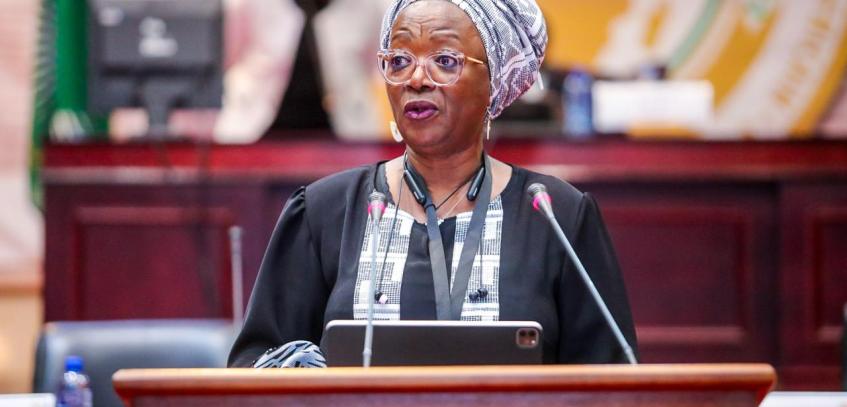The Pan-African Parliament plenary heard the presentation of the report from the Permanent Committee on Gender, Family, Youth, and People with Disabilities. The report, delivered by the Committee Chairperson Hon. Mirriam Gabala, was grounded in the committee's joint workshop held on June 27, 2024, under the theme "Strengthening African Family Values to Ensure Socio-Economic Protection and Security of Citizens."
African Parliamentarians were reminded that the family is the cornerstone of society, where essential values, norms, and behaviors are nurtured in young generations. Acknowledging the family's role as the foundational unit for demographic reproduction and citizen training, the discussions of the joint workshop highlighted the importance of instilling respect, responsibility, and solidarity within the family structure. These values are crucial for the social, economic, and political life of nations. Legislatively, the workshop advanced the objectives of the Action Plan of the Family in Africa (AP), which emphasizes promoting, formulating, implementing, and monitoring AU policies to ensure family protection and support. The family is a central pillar of the AU’s social agenda in the Second 10-Year Implementation Plan (2024-2033) of Agenda 2063.
Social protection was highlighted as both an economic and social imperative, necessitating state and societal intervention to shield citizens from risks, vulnerabilities, and deprivations. The workshop's primary objective was to enhance Parliamentarians' understanding of current AU policies, programs, and objectives concerning the family, thereby enabling them to effectively monitor their implementation. Specific goals included presenting the current state of families in Africa, identifying interruptions in support services, sensitizing Parliamentarians on AU policies, sharing best practices to integrate family approaches in policy formulation, and exchanging optimal family policies among African countries and internationally.
The workshop saw participation from Chairpersons of the Permanent Committees on Health, Labour and Social Affairs, Justice and Human Rights, and Education, Culture and Human Resources, who engaged in the seminar's discussions. Key presentations included insights on the State of Family Research Policy in Africa by Mr. Lefhoko Kesamang from the African Union Commission and Professor Zitha Mokomane from the University of Pretoria. Mrs. Deborah Nyokabi from Equality Now provided an overview of national laws adopted regarding families in Africa. Mrs. Sibanda Opal from the AU African Committee of Experts on the Rights and Well-being of the Child, Mrs. Ruth Mkutumana from the Consortium of Women with Disability (DIWA), and Dr. Nonzozo Mbokazi from the University of Cape Town addressed the situation of family members in Africa, with a special focus on children, people with disabilities, and senior citizens. Professor Sepetla Molapo from the University of South Africa (UNISA) encouraged Parliamentarians to adopt an anti-colonial perspective when formulating African policies.
In terms of recommendations, after the debates, the following recommendations were made to the parliamentarians. The first recommendation is to promote the universal ratification, integration into national laws of the protocols concerning the elderly, disabled people, social protection and security, the well-being and rights of children, as well as the Maputo Protocol and the lifting of reservations. The second recommendation is to initiate laws to remain focused on the family and accelerate the legislation on family law reform at each national level.
Third, allocate sufficient budgets to allow the ministries in charge of social protection and family to fulfill their missions. Fourth, invest in research to collect data on the situation and specific needs of women, particularly the elderly and disabled, for consideration in policy and program development. Fifth, promote inclusive African cultural values by developing family support system strengthening programs aimed at communities and religious institutions.
Finally, develop educational policies that ensure equal access to quality education from early childhood to higher education. In conclusion, given the multiple challenges faced by the different components of the family, there is a need to continue directing efforts towards family support, as well as improving legislation for the development and well-being of African populations.
The interventions by African Parliamentarians in response to the presentation on family values revealed a strong commitment to preserving traditional African norms and values amidst globalized influences. Speakers underscored the cultural unity inherent in African family structures, emphasizing practices that promote intergenerational solidarity and community cohesion. They highlighted concerns about the erosion of these values due to Western influences like gender-neutralization and emphasized the need to protect cultural identities from such external pressures.
Moreover, parliamentarians advocated for integrating African values more prominently into educational curricula and legislative frameworks. They argued that these efforts are essential not only for maintaining social stability but also for fostering a sense of identity and belonging among African youth. By prioritizing the preservation of traditional family roles, these leaders aim to ensure the transmission of essential moral principles, such as respect for elders and communal responsibility, to future generations. Their interventions reflect a broader sentiment within African parliamentary circles to safeguard cultural heritage while navigating the challenges of globalization.








